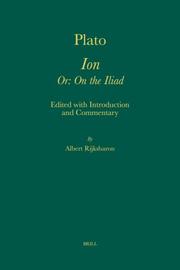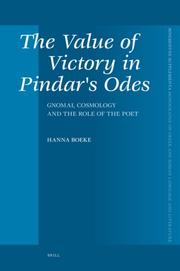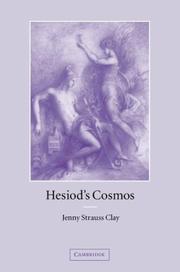| Listing 1 - 5 of 5 |
Sort by
|
Book

Year: 2014 Publisher: Publicacions i Edicions de la Universitat de Barcelona
Abstract | Keywords | Export | Availability | Bookmark
 Loading...
Loading...Choose an application
- Reference Manager
- EndNote
- RefWorks (Direct export to RefWorks)
The underlying theme of Three Centuries of Greek Culture under the Roman Empire is the idea that, under Roman rule, Greek culture was still alive and dynamic and continued to exert a degree of cultural domination, either real or apparent. So, we hope to analyse the meanings of concepts such as “Greek” or “Greece” in the Empire. Are we right to assume that there was a clear opposition between Greek and Roman? Or would it be more accurate to speak of a “Graeco-Roman world”? It would certainly be possible to make a list of “elements of identity”, on both sides —Greek and Roman—, but, in this case, where should the borders between identity and community be placed? Three Centuries of Greek Culture under the Roman Empire presents several approaches to the period between the second and fourth centuries AD from a variety of angles, perspectives and disciplines. Until now, this time has usually been considered to be the junction of the decline between the classical world and the emergence of the medieval world; however, this book establishes a basis for considering the Imperial period as a specific stage in cultural, historical and social development with a distinct personality of its own.
Etnicitat --- Literatura grega --- Imperi Romà, 284-476 --- Grècia --- Segle II-segle IV

ISSN: 13806068 ISBN: 1281939676 9786611939670 9047422872 9789047422877 9789004163218 9004163212 9781281939678 6611939679 Year: 2007 Volume: v. 14 Publisher: Leiden Brill
Abstract | Keywords | Export | Availability | Bookmark
 Loading...
Loading...Choose an application
- Reference Manager
- EndNote
- RefWorks (Direct export to RefWorks)
On the basis of a fresh collation of the four primary manuscripts, this book presents a revised text of Plato's Ion , with full apparatus criticus. The commentary has a strong linguistic orientation; it includes discussions of Platonic vocabulary. Linguistic considerations are also the leading principle in the choice of one MS reading rather than another. Drawing on Byzantine practices and theories, the book pays special attention to questions of punctuation, an area too often ignored in editions of classical texts. The extensive introduction deals with, inter alia, Plato's attack on poetry, the position of the Ion in the corpus Platonicum—rather late, this book argues—, the title(s) of the dialogue, the reasons why MS Venetus 189 should be considered a primary MS, and the text of the Homeric quotations in the Ion.
Poetics --- Aesthetics, Ancient. --- History --- Homer. --- Homer --- Ion (Plato) --- Literatura grega clássica (crítica e interpretação) --- Poesia. --- Homero --- Aesthetics, Ancient --- Poétique --- Esthétique ancienne --- Histoire --- Poetics - History - To 1500 --- Homer - Iliad --- Poétique. --- Platon (0427?-0348? av. J.-C.).

ISSN: 00791687 ISBN: 9789004173569 9789004169876 9789004172067 9004105808 9789004361454 9789004180413 9004172068 9789004105805 9004173560 9004169873 9004180419 9004361456 9789004428386 9004428380 9789004428348 9789004428355 9789004428362 9789004428379 9786612601361 9047425375 1282601369 9786612951503 9004193235 1282951505 9004320989 9004361464 9004428402 9789004320987 9789047425373 9789004193239 Year: 2009 Volume: 148 Publisher: Leiden Brill
Abstract | Keywords | Export | Availability | Bookmark
 Loading...
Loading...Choose an application
- Reference Manager
- EndNote
- RefWorks (Direct export to RefWorks)
Ancient doxography, particularly as distilled in the work on problems of physics by Aëtius, is a vital source for our knowledge of early Greek philosophy up to the first century BCE. But its purpose and method, and also its wider intellectual context, are by no means easy to understand. The present volume contains 19 essays written between 1989 and 2009 in which the authors grapple with various aspects of the doxographical tradition and its main representatives. The essays examine the origins of the doxographical method in the work of Aristotle and Theophrastus and also provide valuable insights into the works of other authors such as Epicurus, Chrysippus, Lucretius, Cicero, Philo of Alexandria and Seneca. The collection can be read as a companion collection to the two earlier volumes of Aëtiana published by the two authors in this series (1997, 2009).
Philosophy, Ancient --- -Ancient philosophy --- Greek philosophy --- Philosophy, Greek --- Philosophy, Roman --- Roman philosophy --- Historiography --- Aetius Arabus --- Philosophie ancienne --- Historiographie --- Aëtius, --- Historiography. --- Ancient philosophy --- Aetius Arabus. --- Aëtius, --- Philosophy [Ancient ] --- Literatura griega --- Historiographie. --- Literatura grega --- Filologia clàssica --- Filologia grega --- Literatura balcànica --- Literatura bizantina --- Literatura clàssica --- Philosophy, Ancient - Historiography. --- Philosophy, Ancient - Historiography - Congresses --- Aëtius, - active 1st century-2nd century --- -Historiography --- Aetius,

ISBN: 1281921777 9786611921774 9047422821 9789047422822 9781281921772 9789004158481 9004158480 661192177X Year: 2007 Volume: 285 Publisher: Leiden Boston
Abstract | Keywords | Export | Availability | Bookmark
 Loading...
Loading...Choose an application
- Reference Manager
- EndNote
- RefWorks (Direct export to RefWorks)
This book investigates the cosmological context of Pindar’s victory odes, and how it influences his presentation of praise. The study first focuses on gnomai as a reflection of cosmology, using these sayings to establish the views the poems reveal on matters such as the divine, the human condition and man in society. This overview is complemented by detailed literary analyses demonstrating how cosmology functions in individual odes. They show that Pindar shapes the poet persona to emphasize different aspects of the traditional world view or represent varying viewpoints so that he can praise each victor according to his particular circumstances. By focusing on cosmology the book highlights a neglected dimension of Pindar’s odes and challenges some traditional views on this poet.
Cosmology, Ancient, in literature. --- Praise in literature. --- Literatura grega clássica. --- Poesia lírica. --- Pindar --- PÍndaro --- Pindarus --- Pindare --- Píndaro --- Pindaros --- Criticism and interpretation. --- Cosmology, Ancient, in literature --- Praise in literature --- Pindaro --- Πίνδαρος --- Greek poetry --- Odes, Greek --- Cosmologie antique dans la littérature --- Eloges dans la littérature --- Poésie grecque --- Odes grecques --- Themes, motives. --- History and criticism --- Thèmes, motifs --- Histoire et critique --- Pindar. --- Criticism and interpretation --- Pindar - Criticism and interpretation

ISBN: 1107137071 128043659X 0511180926 0511062141 0511205074 051130787X 0511482396 0511070608 9780511062148 9780511070600 9780521823920 0521823927 9781280436598 9780511307874 9786610436590 6610436592 9780511482397 9780521117685 0521117682 9781107137073 9780511180927 9780511205071 Year: 2009 Publisher: Cambridge : Cambridge university press,
Abstract | Keywords | Export | Availability | Bookmark
 Loading...
Loading...Choose an application
- Reference Manager
- EndNote
- RefWorks (Direct export to RefWorks)
"Hesiod's Cosmos offers a comprehensive interpretation of both the Theogony and the Works and Days and demonstrates how the two Hesiodic poems must be read together as two halves of an integrated whole embracing both the divine and the human cosmos. After first offering a survey of the structure of both poems, Professor Clay reveals their mutually illuminating unity by offering detailed analyses of their respective poems, their teachings on the origins of the human race, and the two versions of the Prometheus myth. She then examines the role of human beings in the Theogony and the role of the gods in the Works and Days, as well as the position of the hybrid figures of monsters and heroes within the Hesiodic cosmos and in relation to the Hesiodic Catalogue of Women."--Jacket.
Religious poetry, Greek --- Didactic poetry, Greek --- Cosmology, Ancient, in literature. --- Mythology, Greek, in literature. --- Human beings in literature. --- Gods, Greek, in literature. --- Monsters in literature. --- Man in literature --- Greek religious poetry --- Greek poetry --- History and criticism. --- Hesiod. --- Hesiod --- Gesiod --- Geziod --- Esiodo --- Hēsiodos --- Hezjod --- Hésiode --- Hesíodo --- Hesiyodos --- הסיודוס --- Ἡσίοδος --- Knowledge --- Cosmology. --- Cosmology, Ancient, in literature --- Gods, Greek, in literature --- Human beings in literature --- Monsters in literature --- Mythology, Greek, in literature --- History and criticism --- Hesiodus --- Cosmology --- Religious poetry [Greek ] --- Didactic poetry [Greek ] --- Cosmology [Ancient ] in literature --- Mythology [Greek ] in literature --- Gods [Greek ] in literature --- Alceste (Mythologie grecque) dans la littérature. --- Cosmologie antique dans la littérature. --- Didactic poetry, Greek. --- Dieux grecs dans la littérature. --- Homme dans la littérature. --- Kosmologie. --- Literatura grega. --- Monstres dans la littérature. --- Poésie didactique grecque --- Poésie religieuse --- Religious poetry, Greek. --- Wereldbeeld. --- Histoire et critique. --- Hesiodus, --- Hésiode --- Hésiode. --- Hesiodo. --- Hesiodus. --- Et la cosmologie. --- Theogony (Hesiod). --- Works and days (Hesiod). --- Arts and Humanities --- History --- Religious poetry, Greek - History and criticism --- Didactic poetry, Greek - History and criticism --- Hesiod - Theogony --- Hesiod - Works and days --- Hesiod - Knowledge - Cosmology
| Listing 1 - 5 of 5 |
Sort by
|

 Search
Search Feedback
Feedback About UniCat
About UniCat  Help
Help News
News